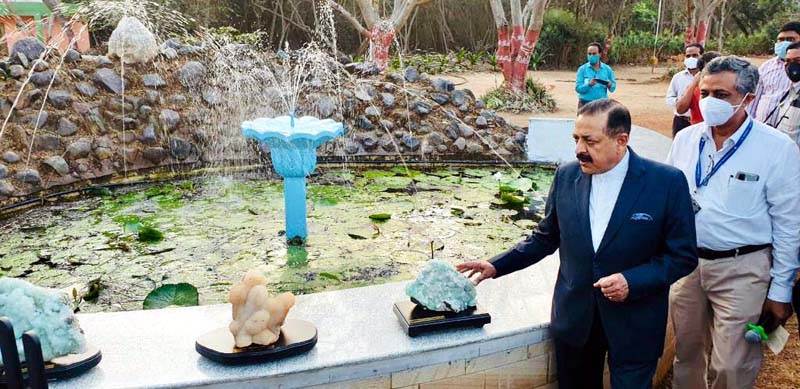
Excelsior Correspondent
HYDERABAD, Jan 6: On the first day of his two-day visit, Union Minister of State (Independent Charge) Science & Technology; Minister of State (Independent Charge) Earth Sciences; MoS PMO, Personnel, Public Grievances, Pensions, Atomic Energy and Space, Dr Jitendra Singh today inaugurated India’s first “Rock” Museum here, which is unique and first of its kind.
The Open Rock Museum, set up with the aim to educate and enlighten the masses about several lesser known facts, displays different types of rocks from different parts of India with ages ranging from 3.3 Billion years to around 55 Million years of the Earth’s history. These rocks also represent the deepest part of the earth upto 175 kms of distance from the surface of the earth.
Each rock has a story of its own to tell, said Dr Jitendra Singh, while going around and spending considerable time inquiring about each of the rock pieces displayed in the open museum.
Later, addressing a galaxy of eminent scientists at CSIR-National Geophysical Research Institute (NGRI), Dr Jitendra Singh said that “Big Earth data” occupies the strategic high ground in the era of knowledge economies and India is fully exploiting this new frontier contributing to the advancement of Earth science. He said, geosciences is contributing significantly towards the self-reliance and national priorities in New India.
The Minister said, Science blended with creative innovation brings “ease of living” for the common man and Scientists should adopt out of box thinking to address the problems of the common public. He said, the expectations of society from scientists are ever growing and scientists should continuously be involved in providing the best S&T solutions.
Dr Jitendra Singh said that the out of box idea was suggested by Prime Minister Narendra Modi, who not only has a natural predilection for science but is also forthcoming in supporting and promoting science and technology-based initiatives and projects.
Referring to CSIR-NGRI’s future research efforts designed for Deep-Earth and Near-Surface explorations, which are critical to understand the processes responsible for shaping Earth’s structure and dynamics, and for sustenance of life on Earth, respectively, Dr Jitendra Singh expressed hope that with its charted vision and mission, CSIR-NGRI will play a vital and pivotal role in coming years to fulfill the aspirations of the nation.
Dr Jitendra Singh also released Earthquake Risk Maps of Lucknow and Dehradun Cities and handed over the maps to the Chairpersons or nominees of UPSDMA and UKSDMA on the occasion. He informed that CSIR-NGRI has made earthquake risk maps for Lucknow and Dehradun cities which are vulnerable for future earthquakes in the Indo-Gangetic plains area. The risk maps were prepared by characterising the hazard and its uncertainty, to serve as input for risk assessment and earthquake resistant design for different applications-ranging from private homes to multi-storied buildings and critical infrastructures such as bridges or dams, he added.
Director, CSIR-NGRI Hyderabad, Dr V.M. Tiwari gave a resume of the activities of the institute while Director General CSIR Dr Shekhar C. Mande also spoke.

